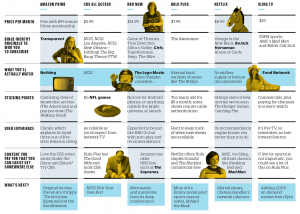The speculation around Viacom’s disconcerting performance detailed in “Viacom is Having a Midlife Crisis” by Felix Gillette was especially eye-opening in relation to mass media and how I think about TV/entertainment today. I don’t really watch TV or any of the “popular” networks under Viacom’s umbrella. However, I do occasionally watch Friday Night Lights and One Tree Hill on Netflix. I’m also an avid Game of Thrones fan. Hence the HBO vs. Netflix dilemma as I’m more familiar with the two networks.
Gillette states that “while Viacom is still profitable…the company is one the least diversified of the U.S. media conglomerates [today]” (6). By that he means that Viacom has made no push to diversify its media channels by launching a digital streaming platform. A majority of their revenue results from cable- or satellite- TV bundles as opposed to other outlets such as Youtube, Netflix, Hulu and Amazon. Youtube, Netflix, Hulu, and Amazon are so problematic for corporate giants like Viacom because their subscriptions are increasingly less expensive than the cable bundles Viacom offers. A company like Netflix (especially) provides more content for less money a month.
HBO, unlike Viacom, realizes the formidable threat that Netflix poses. In “HBO to Netflix: Bring it On,” Nicole Laporte reports on “How HBO’s quest to win the streaming wars became a binge-worthy drama as juicy as Game of Thrones.” HBO CEO Richard Plepler expresses his fears and qualms concerning Netflix’s explosive growth. Eager to counter Netflix’s strategy and set HBO for continued success, HBO launched HBO Now. “It is a stand-alone version of HBO Go, an app that gives access to just about every episode of every HBO series, as well as tons of movies, documentaries, and sports.” Even better, HBO Now does not require a cable subscription but is available to anyone with an Apple device. This aggressive change raised several questions concerning HBO’s reputable and well-respected name and challenged fundamental aspects of company culture. For example, HBO has always been known as a high-quality brand service that “doesn’t have to scramble for ratings or lower its taste to reach a mass market.” Thus far, HBO Now has not sullied the firm’s good name. HBO’s journey pre HBO Now launch makes this story interesting. HBO launched HBO Go which soon after crashed (thanks to the popularity of series like Game of Thrones). HBO experienced difficulty after the HBO Go crash selling its vision as a quality digital entertainment provider. Next came the idea for HBO Now. HBO teamed-up with apple after an unfavorable bid from Rupert Murdock. After several tech setbacks, HBO Now went live April 7, 2015. Just in time for the season 5 premiere of Games of Thrones.
“All the cool TV kids are selling direct to consumers via the Internet. Here’s a field guide to the premium digital video services that have gone “over the top” of traditional cable companies.”

